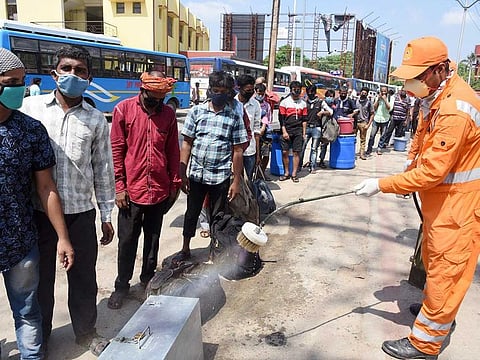COVID-19: India’s migrant labourers — no voting rights, so nobody’s children
India’s migrant labourers are ‘dispensable’ baggage in electoral quid-pro-quo

Dubai: A ‘Shramik Special’ (Labourers’ Special) train carrying 1,200 migrant labourers of Jharkhand from Telangana reached Ranchi on May 2. This was the first of more than 1,414 such trains run by Indian Railways until May 18 to ferry stranded migrant workers from their respective places of work to their native villages. Make a note: The lockdown started on March 24. So it was not before 40 days of a nationwide shutdown that the first concrete measures were taken to answer the call of distress from migrant workers stuck thousands of kilometres away from their states of domicile. By that time, according to a rough estimate, more than 300,000 people had already made their way home from various parts of the country – mostly on foot, with the more fortunate ones managing to hitch rides on commercial vehicles passing by.
A humongous crisis
Reacting to the plight of these home-bound migrant labourers, senior Indian journalist Shekhar Gupta tweeted: “Wanting to go home in a crisis is natural. If Indian students, tourists, pilgrims stranded overseas want to return, so do labourers in big cities. They want to go home to their villages. We can’t be sending planes to bring home one lot, but leave the other to walk back home.”
Does part of this apathy stem from the fact that these migrant labourers do not constitute what in electoral parlance is called a ‘vote bank’? Are their stories not worth telling because these people usually do not have a say in the winds of change or permanence that decide political fortunes in the world’s largest democracy?
The answer is a definitive ‘YES’.
The youths opted for the latter!
And it’s not just a tale of apathy, but greed and opportunism as well, whereby, sacrificing the welfare priorities of migrant labourers at the altar of profit maximisation is par for the course!
Exodus of cheap labour
As the first wave of migrant labourers started leaving their respective places of work to be back with their families in their native villages, when the lockdown was announced for the first time on the night of May 23, builder lobbies in India’s crucial real estate sector could clearly see a long-term danger to their fortunes. The exodus of cheap labour from states such as Maharashtra, Karnataka, Gujarat, Haryana, Uttar Pradesh — with strong real estate portfolios — saw alarm bells ringing among the realtors and pressure soon started building on the respective state governments to try and stop the sudden outflow of migrant labourers from the states. On May 5, the Karnataka government announced cancellation of special trains meant for transporting labourers back to their home states. Following a massive public uproar, that decision was rescinded a few days later. However, migrant labourers in Uttar Pradesh were not so lucky as the state government passed an ordinance to suspend 35 of the 38 labour laws available in the state.
So far as legal support for migrant labourers is concerned, the least said the better. The Inter-State Migrant Workers’ Act, 1979, aims to safeguard the social and economic rights of migrant labourers. However, this legal provision is archaic and is hardly ever enforced.
The net result is labourers walking home and even dying ‘nondescript’ deaths in pursuit of a tomorrow that continues to elude them.
Sign up for the Daily Briefing
Get the latest news and updates straight to your inbox







